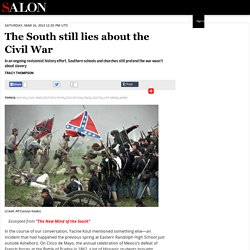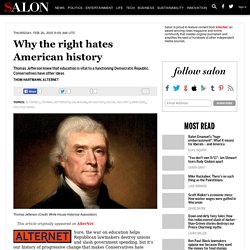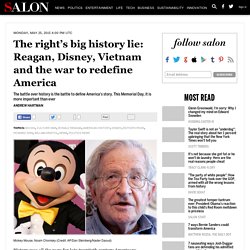

The South still lies about the Civil War. In the course of our conversation, Yacine Kout mentioned something else—an incident that had happened the previous spring at Eastern Randolph High School just outside Asheboro.

On Cinco de Mayo, the annual celebration of Mexico’s defeat of French forces at the Battle of Puebla in 1862, a lot of Hispanic students brought Mexican flags to school. The next day, Kout said, white students brought Confederate flags to school as a message: This is our heritage. The Civil War is like a mountain range that guards all roads into the South: you can’t go there without encountering it. Specifically, you can’t go there without addressing a question that may seem as if it shouldn’t even be a question—to wit: what caused the war? One hundred and fifty years after the event, Americans—at least the vast majority who toil outside academia—still can’t agree.
At the bottom of all of these is one basic question: was the Civil War about slavery, or states’ rights? Popular opinion favors the latter theory. Lessons From McGraw Hill: The Eurocentric Influence on History Textbooks and Classrooms. Earlier this month, McGraw Hill found itself at the center of some rather embarrassing press after a photo showing a page from one of its high-school world-geography textbooks was disseminated on social media.

The page features a seemingly innocuous polychromatic map of the United States, broken up into thousands of counties, as part of a lesson on the country’s immigration patterns: Different colors correspond with various ancestral groups, and the color assigned to each county indicates its largest ethnic representation. The page is scarce on words aside from an introductory summary and three text bubbles explaining specific trends—for example, that Mexico accounts for the largest share of U.S. immigrants today. The recent blunder has to do with one bubble in particular. Pointing to a patch of purple grids extending throughout the country’s Southeast corridor, the one-sentence caption reads: McGraw Hill swiftly did its damage control.
Take the Civil War. Related Video. Why the right hates American history. Sure, the war on education helps Republican lawmakers destroy unions and slash government spending, but it’s our history of progressive change that makes Conservatives hate accurate depictions of our past.

Just think about Social Security, The New Deal, freeing the slaves, or child labor laws… all represent great turning points in our nation that progressives made possible. The fact is, our entire history – from our revolution to healthcare reform – is filled with progressive accomplishments, and it’s hard to sell the Conservative brand to people who know that history. Many of the today’s biggest political issues, like our privacy rights, would not even be up for debate today had it not been for the attack on education.
If more Americans had had a strong understanding of our history, George W. Bush and Dick Cheney would have never been able to pull off the Patriot Act. Thomas Jefferson recognized that education is vital to a functioning Democratic Republic. The right’s big history lie: Reagan, Disney, Vietnam and the war to redefine America. History was all the rage for late-twentieth-century Americans.

Genealogical research became increasingly common, museum and monument construction boomed, and Civil War reenactment mushroomed into a veritable national pastime. In 1995 the A&E Television Networks launched the History Channel, which immediately drew high ratings for a programming schedule that included a hefty dose of shows about World War II, particularly about Hitler. The Walt Disney Company sought to cash in on this obsession in the early 1990s with a theme park dedicated to American history.
Disney’s America was to have been part heritage, part amusement, a mix of “serious” and “fun.” Similar to other living history museums such as Colonial Williamsburg, Disney’s America was to simulate momentous events in American history. The Disney history flap demonstrated that although Americans were taking an extraordinary interest in the nation’s past, they disagreed fervently about how it should be represented. Anti-Intelectualism. Education & The class war. Black Media to Take Another Hit? The Potential Sale of Howard University's WHUT Considered.